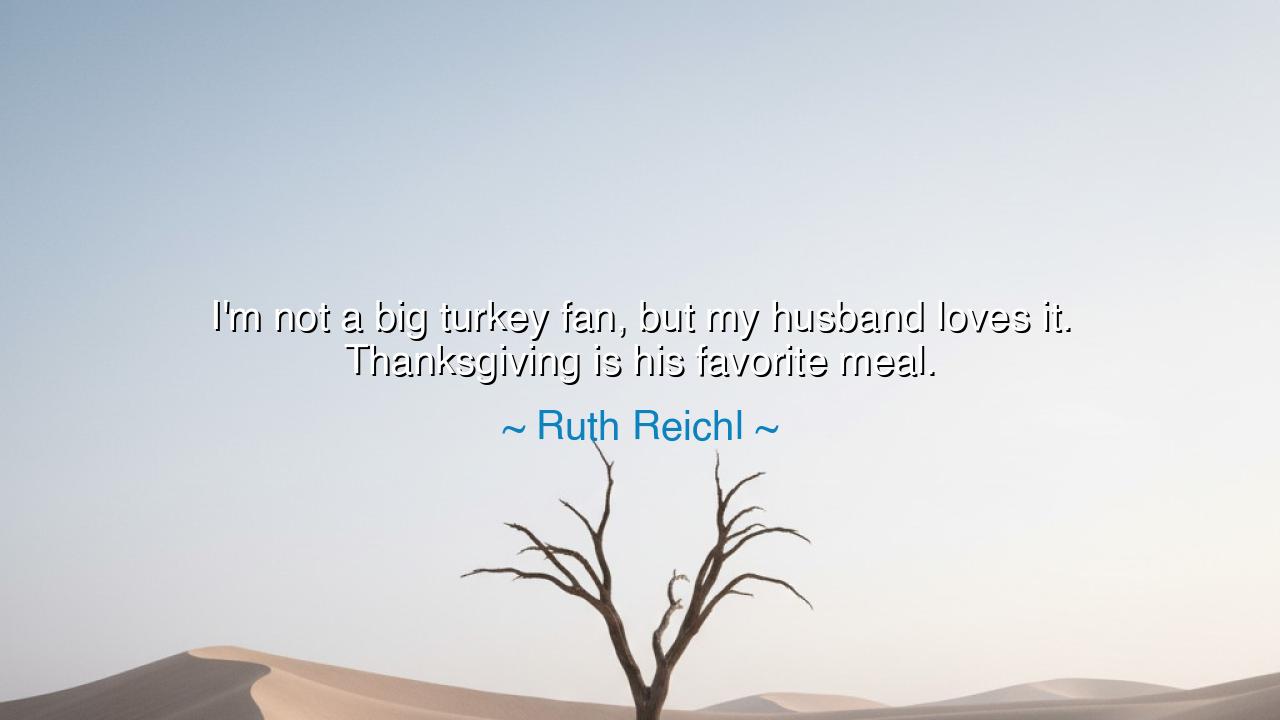
I'm not a big turkey fan, but my husband loves it. Thanksgiving






Ruth Reichl, the chronicler of taste and memory, once confessed with honesty and warmth: “I’m not a big turkey fan, but my husband loves it. Thanksgiving is his favorite meal.” These words, though simple, unveil a truth deeper than the flavor of poultry or the tradition of feast. They speak of the mysterious union of love, where one sets aside personal desire to honor the joy of another. In this confession lies the secret of enduring companionship: not agreement in all things, but the willingness to cherish what the beloved cherishes.
The origin of this saying flows from Reichl’s life as both a food writer and a wife. She has spent her days exploring flavors, questioning traditions, and seeking meaning at the table. Yet here, she reveals that for her husband, the essence of joy is bound to the Thanksgiving meal—a ritual of abundance, family, and gratitude. Though she herself does not delight in the turkey, she delights in him, and so the feast becomes precious to her because it is precious to the one she loves. This is the ancient wisdom of marriage and friendship: to love what the other loves, even when your own taste differs.
History is rich with such examples. Consider the tale of Abigail Adams, wife of John Adams, who often disagreed with her husband’s politics, yet never ceased to support his calling. She endured hardship, separation, and loneliness, not because she loved politics, but because she loved the man who bore that burden. Just as Reichl honors her husband’s favorite meal, so Abigail honored her husband’s mission. Great bonds are not forged in sameness, but in respect, sacrifice, and the joy of seeing the other fulfilled.
The turkey, then, becomes more than a bird upon the table. It is a symbol of giving, of compromise, of shared tradition. Where one sees only dry meat, another sees memories of childhood, laughter with kin, the warmth of gathering around a table heavy with blessing. By partaking in the feast, even without delight in the dish, Reichl demonstrates that the heart’s true nourishment lies not in flavor but in fellowship. In the same way, each of us is called to lay aside small preferences for the greater joy of unity.
This is a lesson needed in our age, when many cling stubbornly to self above all else. True love, whether between partners, families, or nations, requires the humility to honor another’s delight. If your companion loves music you do not understand, listen anyway. If your friend cherishes a tradition that feels foreign to you, join them. If your family celebrates a ritual that is not your favorite, participate with grace. These small offerings build bridges, and these bridges endure longer than fleeting pleasures.
The practical action is clear: at your own tables, look not only to what pleases you, but to what pleases those you love. Ask yourself: What can I do today that will bring joy to another, even if it costs me nothing more than a little patience or a change in taste? In doing so, you practice the art of devotion, the sacrifice that sweetens love and strengthens bonds. For in the end, the memory that remains is not whether the food was your favorite, but whether the table was filled with love.
So, O listener, mark the wisdom of Ruth Reichl’s humble words. Thanksgiving is not about the turkey, nor about any single dish. It is about the feast of love, about the joy of seeing another’s heart uplifted, about joining in traditions that bind families and generations. Even if the meal is not your own delight, rejoice in the delight of others. For this is the way of love: to find happiness in another’s happiness, to make sacred the ordinary through the power of shared joy. And this, more than any dish, is the true banquet of life.






AAdministratorAdministrator
Welcome, honored guests. Please leave a comment, we will respond soon